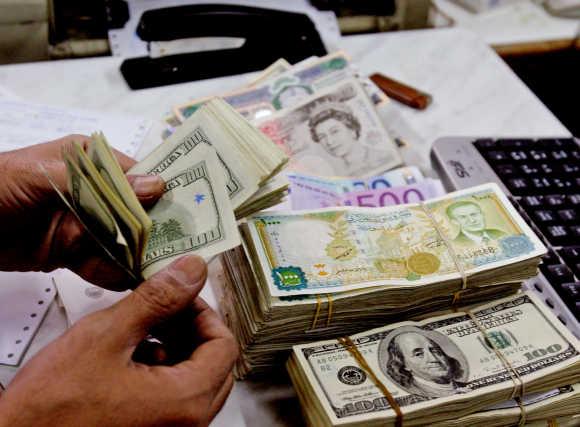Photographs: Darrin Zammit Lupi/Reuters BS Bureau
Mauritius is back in the news, and as usual not for the right reasons.
The move by the Foreign Investment Promotion Board (FIPB) to reject three foreign direct investment (FDI) proposals routed through the island nation came days before the finance minister himself went to the United States marketing India as an investment destination.
The tour was part of the government’s efforts to arrest the fall in the value of the rupee, which is facing the brunt of the global rush towards the strengthening greenback.
The rejections have been on the grounds that these investors did not reveal the identity of the ultimate beneficial owner.
Given the circumstances, the government’s message is clear: the quality of money is as important as its quantity, no matter how desperate the government is to attract foreign capital.
While this has been the official position, there has been insufficient positive action to ensure that the money coming in was clean. The FIPB decision, therefore, needs to be reinforced by a further crackdown on other such non-transparent entities.
After all, a finance ministry-commissioned report last year pointed out that from 1948 to 2008 a total of $213.2 billion was shifted out of India through illicit outflows.
...
Black money: Tackling the controversial Mauritius route
Image: Foreign currency traders work inside a trading firm behind the signs of various world currencies, in Mumbai.Photographs: Vivek Prakash/Reuters
Citing estimates made by the Global Financial Integrity, the report further stated that, when adjusted for returns earned over the years, the gross transfer of illicit assets by residents of India amounted to $462 billion as of the end of December 2008.
The report tried to link this to flows from Mauritius. Quoting numbers from the Department of Industrial Policy and Promotion, it said that from April 2000 to March 2011, FDI from Mauritius was 41.8 per cent of the total FDI received by India.
The report said, “Mauritius and Singapore with their small economies cannot be the sources of such huge investments and it is apparent that the investments are routed through these jurisdictions for avoidance of taxes and/or for concealing the identities from the revenue authorities of the ultimate investors, many of whom could actually be Indian residents, who have invested in their own companies, through a process known as round-tripping.”
...
Black money: Tackling the controversial Mauritius route
Image: A cashier counts currency notes at one of Syria's commercial banks in Damascus.Photographs: Khaled Al Hariri/Reuters
The modus operandi of this round-tripping process has been laid bare. A database put out by the International Consortium of Investigative Journalists shows that a few hundred Indians are owners of companies registered in offshore financial centres such as the British Virgin Islands and Cayman Islands.
While some of these might be for legitimate purposes, others certainly are not. Some centres, such as Singapore, have cleaned up their act and have enforced stringent conditions such as minimum capital requirements and employment conditions for companies in their jurisdictions.
However, it is not clear whether these address the question of tracking down the ultimate beneficial owner. And when the government tries to confront people named in such databases, they seem to be hiding behind the claim that the data were stolen.
When the government asks for the data, the banks and intermediaries cite client confidentiality - and if someone gets the data by other means, they cry foul. That leaves only two points for the authorities to check illicit money flows: the point of exit and the point of re-entry.
...
Black money: Tackling the controversial Mauritius route
Image: A bank employee counts one hundred dollar notes at a bank in Seoul.Photographs: Lee Jae Won/Reuters
The government seems to be in better control of the latter. However, offshore financial centres, such as Mauritius, argue that India should intercept black money when it exits the country in the first place, since targeting the re-entry point could deter genuine investments.
They also point out that a fund manager who is raising money from around the world cannot become a forensic accountant and go several layers behind the client’s money. If he is asked too many questions, he may not raise enough money to invest in India. But that concern could be exaggerated.
In any case, India should not relax in its drive against round-tripping or illicit money flows. The FIPB’s decisions last week are a signal in that direction.






article